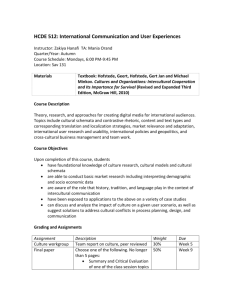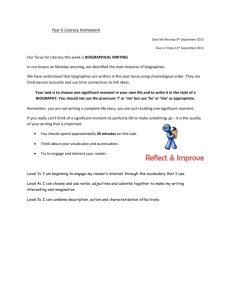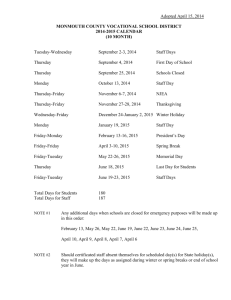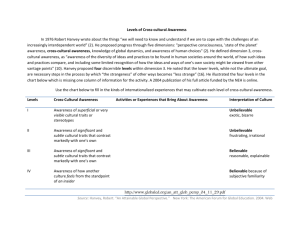CROSS-CULTURAL PSYCHOLOGY (Spring 2014) Reggie Pawle
advertisement
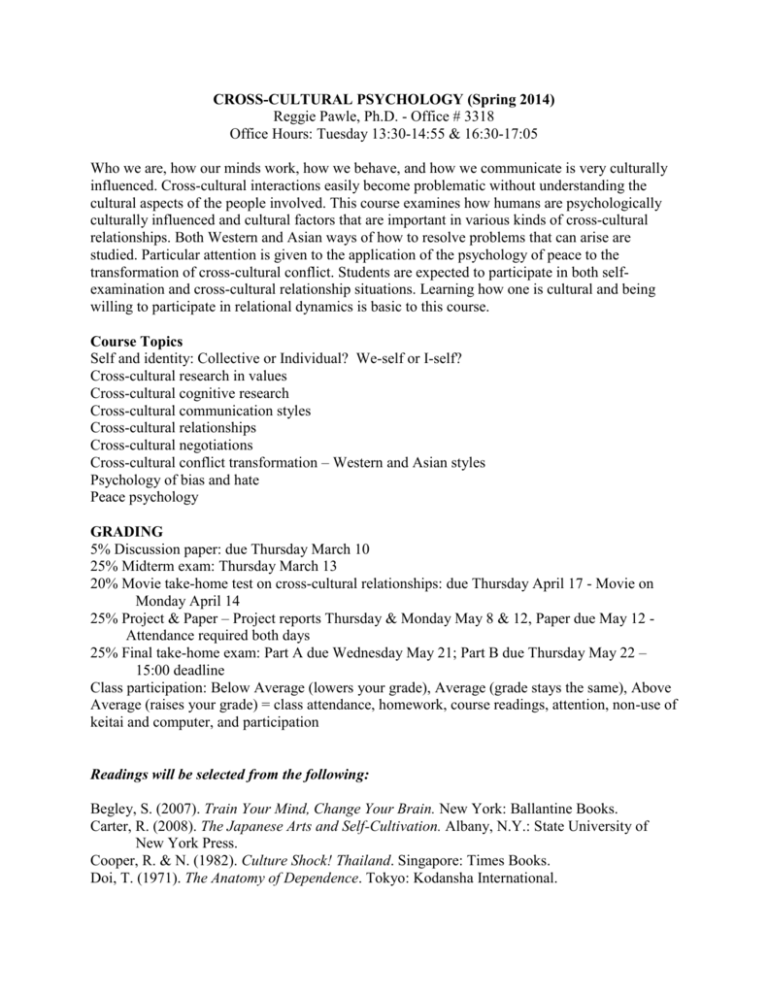
CROSS-CULTURAL PSYCHOLOGY (Spring 2014) Reggie Pawle, Ph.D. - Office # 3318 Office Hours: Tuesday 13:30-14:55 & 16:30-17:05 Who we are, how our minds work, how we behave, and how we communicate is very culturally influenced. Cross-cultural interactions easily become problematic without understanding the cultural aspects of the people involved. This course examines how humans are psychologically culturally influenced and cultural factors that are important in various kinds of cross-cultural relationships. Both Western and Asian ways of how to resolve problems that can arise are studied. Particular attention is given to the application of the psychology of peace to the transformation of cross-cultural conflict. Students are expected to participate in both selfexamination and cross-cultural relationship situations. Learning how one is cultural and being willing to participate in relational dynamics is basic to this course. Course Topics Self and identity: Collective or Individual? We-self or I-self? Cross-cultural research in values Cross-cultural cognitive research Cross-cultural communication styles Cross-cultural relationships Cross-cultural negotiations Cross-cultural conflict transformation – Western and Asian styles Psychology of bias and hate Peace psychology GRADING 5% Discussion paper: due Thursday March 10 25% Midterm exam: Thursday March 13 20% Movie take-home test on cross-cultural relationships: due Thursday April 17 - Movie on Monday April 14 25% Project & Paper – Project reports Thursday & Monday May 8 & 12, Paper due May 12 Attendance required both days 25% Final take-home exam: Part A due Wednesday May 21; Part B due Thursday May 22 – 15:00 deadline Class participation: Below Average (lowers your grade), Average (grade stays the same), Above Average (raises your grade) = class attendance, homework, course readings, attention, non-use of keitai and computer, and participation Readings will be selected from the following: Begley, S. (2007). Train Your Mind, Change Your Brain. New York: Ballantine Books. Carter, R. (2008). The Japanese Arts and Self-Cultivation. Albany, N.Y.: State University of New York Press. Cooper, R. & N. (1982). Culture Shock! Thailand. Singapore: Times Books. Doi, T. (1971). The Anatomy of Dependence. Tokyo: Kodansha International. Dozier, R. (2003). Why We Hate. New York: McGraw-Hill. Easwaran, E. (2011). Gandhi the Man: How One Man Changed Himself to Change the World. Tomales, California: Nilgiri Press. Frankl, V. (1959). Man’s Search for Meaning. Boston: Beacon Press. Greiff, N. (2005). True Conflict Resolution. In Kaihan, Vol 5, No. 1 (Winter), pp. 1, 5, 7. Heine, S. (2008). Cultural Psychology. New York: W.W. Norton and Co. Hofstede, G., Pedersen, P., & Hofstede, G. (2002). Exploring Culture: Exercises, Stories, and Synthetic Cultures. Yarmouth, Maine: Intercultural Press. Hofstede, G, & Hofstede, G. (2005). Cultures and Organizations: Software of the Mind. New York: McGraw-Hill. Macy, J. (1991). Mutual Causality in Buddhism and General Systems Theory. Albany, New York: State University of New York Press. Marano, H. (2003). Our Brain’s Negative Bias. In Psychology Today, June 20. Muramoto, K. (2012). (Ed.). 歴史のトラウマの世界間連鎖と和解修復の試み:国際セミナー (南京思い起こす2011)の記録(Generational Transmission of War Trauma and Approaches to Reconciliation and Restoration: Report on “Remembering Nanjing 2011.” Kyoto: Institute of Human Sciences, Ritsumeikan University. Naranjo, C. Gestalt Therapy: The Attitude and Practice of an Atheoretical Experientialism. Nevada City, California: Gateways/IDHHB Publishing. Nisbett, R. (2003). The Geography of Thought: How Asians and Westerners Think Differently … And Why. New York: Free Press. Pirazzi, C. & Vasant, V. (2004). Thailand Fever: A Road Map for Thai-Western Relationships. Bangkok: Paiboon Poomsan Publishing. Pawle, R. (2009). Negotiating for a Life in a Buddhist Way: A Case of Cross-Cultural Communication and Ecology. In Japanese Religions, Vol 34, No. 1 (January, 2009), pp. 83-88. Perls, F. (1969). Gestalt Therapy Verbatim. Highland, New York: The Gestalt Journal. Roland, Alan. (1988). In Search of Self in India and Japan: Toward a Cross-Cultural Psychology. Princeton: Princeton University Press. Roland, A. (1996). Cultural Pluralism and Psychoanalysis: The Asian and North American Experience. New York: Routledge. Seelye, H. (1996). Experiential Activities for Intercultural Learning. Yarmouth, Maine, USA: Intercultural Press. Storti, C. (1999). Figuring Foreigners Out: A Practical Guide. Yarmouth, Maine, USA: Intercultural Press. Student Papers, Unpublished: Sawako Kojima, Sylvia Tonui, Moe Kurachi. Weil, P. (2002). The Art of Living in Peace: Guide to Education for a Culture of Peace. Paris: United Nations Educational, Scientific and Cultural Organization. Wile, D. (1988). After the Honeymoon: How Conflict Can Improve Your Relationship. New York: John Wiley & Sons. Yalom, I. (1980). Existential Psychotherapy. New York: Basic Books. Yomiuri Shinbun & Japan Times, Japanese newspapers, various articles. CROSS-CULTURAL PSYCHOLOGY (Spring 2014) Reading Assignments – PRE1 (1st reading packet) Who We Are – Cultural self Week 1 – Reader Class #1 – introduction – identity, meaning, negativity bias Monday – introduction- Cultural identity – Constructionism – Nature vs. Nurture vs. ? Muramoto, pp. 388-391 – “social body;” self-examination Thursday – Reader Class #2– Meaning and the brain Dozier, pp. 1-22; Marano: “Our Brain’s Negative Bias.” Snap judgments - https://implicit.harvard.edu/implicit/; “Is what you see what you get?” Week 2 – Interpretation; Cultural identity Monday - Reader Class #3- Cultural interpretation of behavior – Prejudice & Red Flags Seelye - red flags; Pirazzi & Vasant – “Common sense;” Hofstede & Hofstede, pp. 1-8. Wideman, “The Seat Not Taken” article. “Australian writer jailed for royal insult.” Thursday – Reader Class #4 - Identity - I-self, We-self Roland, Student stories, “Different Perspectives on Individual Liberty.” Cross-cultural questionnaire. Roland handout. Week 3 – Cognitive styles; Value Dimensions Monday - Reader Class #5 - Cognitive styles: perception & thinking Nisbett, pp. 79-96 & 137-147. Thursday – Reader Class #6 - Hierarchy-equality Hierarchy-Equality - Hofstede, et. al.; “As American As Apple Pie, As Japanese…” Hofstede website: http://www.geert-hofstede.com/hofstede_dimensions.php?culture1=95&culture2=50#compare Week 4 – Value Dimensions Monday – Reader Class #7 - Individualism and collectivism Hofstede & Hofstede; “Being an Individual or Joining the Group;” “Unhelpful clerks …” Thursday – Reader Class #9 - uncertainty tolerance & short-term/long-term orientation Hofstede, et. al.; Hofstede, et. al.; article on uncertainty tolerance. Week 5 – Value Dimensions; Discussion Paper Monday – Reader Class #8 - gender Gender - Hofstede, et. al.; “Steadfast young men...” Thursday – Reader Class #10 - Communication Styles; Discussion Paper due. Communication factors; Storti; Young, in Roland (1996). Week 6 – Values and communication Monday – Reader Class #11 - Review class & cross-cultural negotiation styles Hofstede & Hofstede, pp. 338-340, 358-362; Singelis & Pedersen, 184-187; Pawle – Cambodia story; “The Dear Leader’s heinous act.” (Confucian values) Thursday – Midterm Exam Reading Assignments – PRE2 (2nd reading packet) Cross-cultural relationship negotiations Week 7 – Relationship styles Monday - Reader Class #12 - Relationship styles – Independent Nisbett, pp. 56-68 & 76-77; Heine, pp. 144-146, 182-186; Yalom, need-free love. Thursday – Reader Class #13 - Relationship styles - Interdependent Doi; Young, pp. 63-67; Confucian teachings; Student story – Madhu. CROSS-CULTURAL PSYCHOLOGY (Spring 2014) REVISED Reading Assignments – PRE2 (2nd reading packet) CROSS-CULTURAL PSYCHOLOGY: Cross-cultural interactions Week 8 – Guest Speaker; Conflict resolution styles Monday – Guest speaker on identity & communication in a cross-cultural context – Alex Scott Thursday – Reader Class #14 - Independent conflict resolution styles Wile - Communication guidelines & role play; Pirazzi & Vasant; Week 9 – Conflict resolution styles; Case studies Monday – Reader Class #15 - Interdependent conflict resolution styles Pirazzi & Vasant; Cooper. Thursday – Review and case studies Homework – bring to class a story of cross-cultural interaction Analyze this story according to negotiation style, communication, values, interpretation, self (I-self/We-self) Week 10 – Movie & cross-cultural relationships movie take-home test; Meaning Monday - movie - “My Darling is a Gaijin” (ダーリンは外国人) Who We Can Be? Peace Psychology Thursday – Reader Class #16 - Meaning – Logotherapy; movie take-home test due Frankl, pp. 82-83, 88-91, 103-111, 116-125. Cross-Cultural Negotiation Week 11 – Peace values; 1st person approach Monday – Reader Class #20 - Peace Values Weil, pp. 27-32, 36, 47-64; Dozier, pp. 31-37; Questionnaire; Seville statement; Nagler. Thursday – Reader Class #17 - 1st person approaches in China-Japan historical relationship Muramoto, pp. 350-363 & 406-417; “Facing demons after serving Mao.” Week 12 – Non-violence; Dozier, Buddhist & Daoist Monday – Reader Class #18 - Gandhi - Non-violence Easwaran, pp. 20-23, 149-166, 187-204; Gandhi, pp. 29-33. Thursday – Reader Class #19 – Dozier & mindfulness, non-separation & yielding Greiff, pp. 1, 5, 7; Dozier, pp. 41-48; Hanh, pp. 1-19, 54-62, 71-75. Week 13 – Projects Monday – No class - Holiday Thursday – Projects Week 14 – Projects; Project papers Monday – Projects; Project papers due Thursday – Reader Class #21 - Dreams – Gestalt – Past, Present, & Future Naranjo, pp. pp. 6-17; Perls, pp. 101-103, 128-134; “Dancer says imagination is key to a full life” article. Week 15 – Take-Home Final exam Part A due Wednesday May 21; Part B due Thursday May 22 – 15:00 deadline Tuesday – Reader Class #16 - Change & Causality Begley, pp. 5-11, 131-137, 150-152; Macy, pp. 7-10, 91-96, 101-102.
